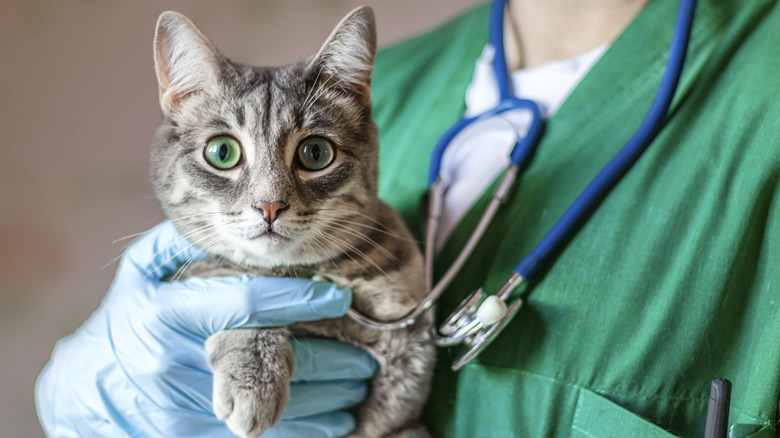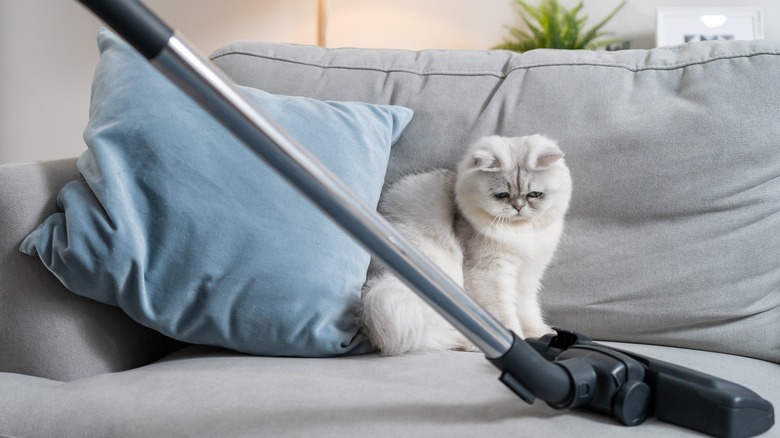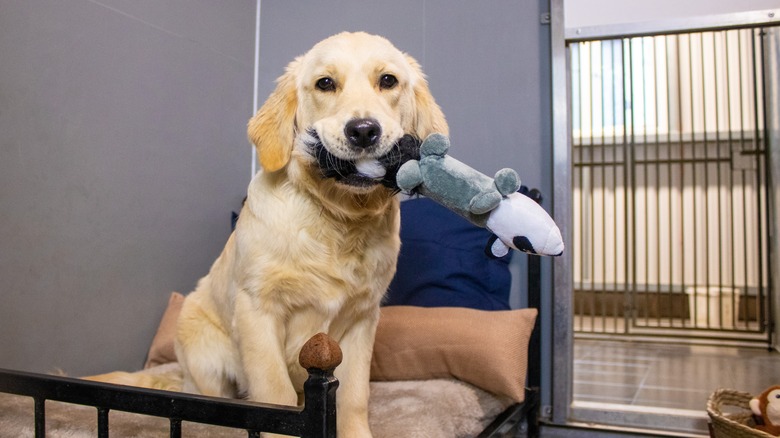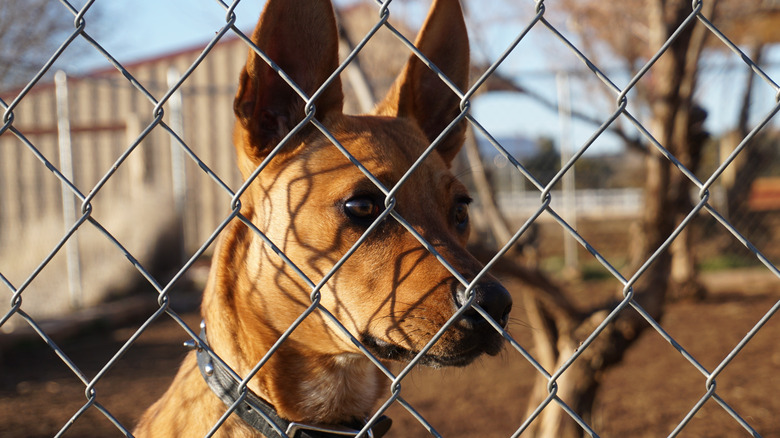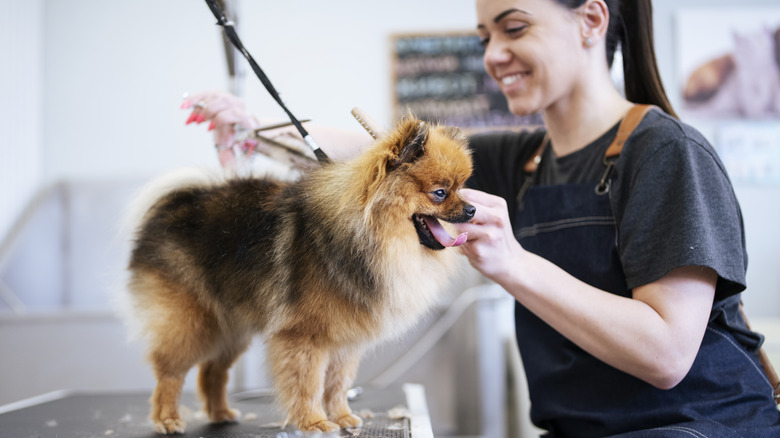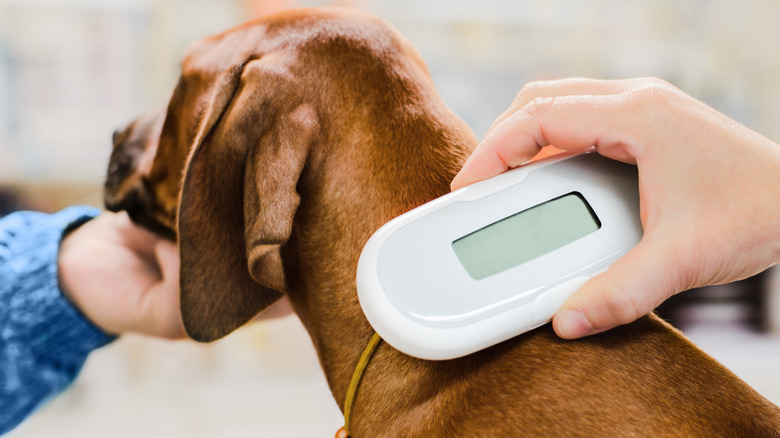The Hidden Costs Of Pet Ownership
Getting a pet can be one of the most rewarding things anyone can do, but pet ownership doesn't come without costs that can add up quickly. It's important to commit to being a responsible pet owner before bringing an animal into your life, and that starts with making sure you're fully aware of what you'll need to provide (and pay for) to help keep your pet healthy and comfortable.
Sure, you already know that you'll need to purchase plenty of pet food — but that's not the only expense to consider (and be prepared to cover) before you bring an animal into your life and home. Take some time to explore the hidden costs of pet ownership and then make an informed decision. Becoming a pet owner is a long-term commitment that requires both time and money. In return, you'll benefit from the unconditional love and companionship of a well-cared-for pet. Chances are that you'll decide that the added cost — assuming there is room in your budget — is money well spent.
Veterinary care and treatment
Veterinary care is a fact of life when you have a pet. Even perfectly healthy pets should go to the veterinarian at least once per year for a wellness visit. According to the American Society for Prevention of Cruelty to Animals (ASPCA), the typical cost of a wellness visit is about $225 for a dog and $160 for a cat.
Annual checkups may not be the end of the story when it comes to the healthcare costs of pet ownership. For example:
- Most U.S. states require rabies vaccinations, and other vaccines are recommended to maintain good health.
- Puppies and kittens should receive a series of vaccines, so they'll require multiple vet visits in the first year.
- You'll also need to get your companion spayed or neutered at the right age, which, per the ASPCA, generally costs about $300 for dogs and $150 for cats.
It's also important to be prepared to cover the cost of veterinary care any time your pet gets sick or is injured. The cost of care can vary greatly, based on what is wrong with your pet and how it is treated. Pet health insurance is an option to consider, but that'll add a monthly expense to your budget. Pet health insurance premiums average around $55 per month, though the cost varies based on the type and age of the pet and what's covered.
Heartworm prevention
Keeping your pet healthy requires more than an annual wellness checkup and recommended or required vaccinations. Whether your pets spend most of their time indoors or outside, it's very important to provide them with ongoing preventive care to protect them against contracting heartworms, which is an important preventative care treatment that your veterinarian will strongly encourage you to provide for your pet. Available in pill or injection, heartworm preventatives must be prescribed by a veterinarian, who will likely require a yearly screening for heartworm infection before your pet's prescription will be renewed.
According to the American Heartworm Society, heartworm prevention can cost up to $200 per year, which is money well spent. Without regular preventive treatment, pets are at a high risk of contracting heartworms, which can be difficult to treat and are often fatal. As many as one in every 100 dogs contract heartworms in the U.S. every year. The cost of treating an animal with heartworms can be well over $1,000, with no guarantee of recovery.
Flea and tick prevention and treatment
In addition to proactively protecting your pet from heartworms, it's also important to take steps to keep ticks and fleas at bay. There are quite a few flea and tick prevention options available, including over-the-counter products and ones that require a veterinary prescription. Quality preventatives generally cost between $10 and $25 per month. Proper lawn maintenance can also help keep ticks and fleas at bay. The best plan is to keep your grass cut short and regularly trim your hedges. With the right equipment, you can do this yourself. Otherwise, you'll need to pay for a lawn care service (which can cost over $100 per visit).
If — despite your best efforts — your pet is targeted by fleas and ticks, you'll need to treat them right away, both to ensure their well-being and your own (because the fleas and ticks will bite you, too). If your pets bring fleas and/or ticks into your home, you'll need to bring in an exterminator to eliminate these pests, which will probably cost between $100 and $450. You'll also need to purchase specialized flea dip shampoo for bathing affected pets or take them to the veterinarian or a groomer to be treated. Beyond that, if you or anyone else who lives in your home suffers ill effects related to flea or tick bites, you'll also have human healthcare expenses to pay.
Extra rental fees
If you don't own your own home, you should be aware that having a pet can impact how much you will have to pay to rent an apartment or house, as well as where you can live. Some landlords don't allow pets at all, so your rental options will be more limited when you have a pet (or pets) than if you do not. Additionally, some properties that allow tenants to have pets have a weight limit or prohibit certain breeds or species. The fact that a landlord allows pets in general doesn't necessarily mean that your pet will be welcome.
Rental properties that do accept pets generally charge extra fees for furry tenants, as well as other types of pets. Some rental properties require a non-refundable pet fee, while others charge a pet deposit that you may get back in part or in full when you move out. Some places even add an extra amount to the monthly rent for each pet that a tenant has. Zillow reports that pet fees and/or deposits can cost up to $500, while monthly pet rent can add between $25 and $100 per month, per pet, to the total rent amount. Pet-related housing fees can make a big dent in your finances, which can set you back significantly — especially if you're trying to save up money to buy your first home.
Cleaning up after your pet
Whether you own or rent your home, it's important to consider how having an indoor pet will impact the way you need to clean your living space. After all, pets tend to shed and they're not odor-free, even when bathed regularly. Sometimes pets have potty accidents that have to be cleaned up, especially when they are very young or very old. When you have pets in your home, you'll need to add odor removal supplies and specialized pet cleaning equipment to your home maintenance stash, including a quality high-powered vacuum cleaner that's specially designed to deal with pet hair. You'll probably start going through a whole lot more vacuum cleaner bags than usual as well.
Even with regular sweeping and vacuuming, if you have indoor pets you'll probably need to steam clean your carpet and furniture regularly. To do this, you'll need to purchase or periodically rent a steam cleaner or bring in a professional cleaning service (which can cost several hundred dollars per visit). If pet odors get out of control, you may even need to replace some of your flooring and furniture.
Cost of traveling with pets
If you enjoy traveling, be sure to consider how having pets may impact your wandering ways before you become a pet owner. Some people travel with their pets, while others bring in pet sitters or leave their companion animals at boarding facilities while they're on the road. These can all be viable options for pet owners who love to travel, but they're most definitely not free. The average cost of an overnight kennel stay is $35, while in-home overnight pet sitting can cost up to $75.
If you like the idea of traveling with pets, you'll be happy to learn that there are quite a few pet-friendly hotels, but they generally charge extra to guests who bring pets with them. Many charge a nonrefundable pet fee, often referred to as a pet sanitation fee, that ranges from $75 to $150 per stay. Some properties have per-night pet fees, which increase the room rate by about $30 per night per pet. Be sure to check the fine print, as some hotels have a limit on the number of pets allowed in a room, a weight limit, or breed restrictions. Some also require owners to keep their dogs crated when they're left alone in the room. You'll also be liable for any damage your pet may cause.
Obedience classes/training
If your pet is a dog, you may find that an obedience school program or individual training is an investment that's more than worth the cost — even if this isn't an expense you were expecting to have to pay. Any time you bring home a new dog, whether it's a puppy or an adult, there will probably be an adjustment period during which the animal exhibits what may seem to be problem behaviors. However, these behaviors are usually stress-related or bad habits from the animal's previous living situation. Such issues can often be corrected through training, which you can easily remedy by participating with your pet in an obedience class or enlisting the services of a professional dog trainer.
Most pet stores offer puppy and adult dog training classes, which cost between $150 and $300 for a multi-week program. Private training is also an option, though it does tend to cost quite a bit more than a class with several participants. Private training typically costs around $140 per hour, on average. As another option, you may be able to train your dog on your own, which will only cost you some time and a few treats.
Pet toys and treats
Speaking of treats, many pet owners love the idea of providing their pets with a supply of fun toys and tasty treats to enjoy. If you're in this group of pet parents, you should be aware that extras like these don't come free, or even cheap. Of course, it's fine to shower your pets with nom-nom treats and entertaining activities to help keep them busy, as long as you can afford it and aren't making room in the budget by cutting corners on necessities. Just make wise decisions and budget appropriately.
The cost of treats and toys can vary a lot, but it's pretty easy to spend as much on treats as on food each month if you're not careful when making your selections. Toys add up quickly, too, so moderation is key to keeping your spending in this area under control. One way to keep your pet pampered with all the extras is to make your own homemade pet treats instead of purchasing them at the store. Regarding toys, look for ones that will last a long time and consider the expenditure as an investment in giving your pet something to deter them from chewing on household items.
Replacing damaged items
Even the most well-intentioned and ordinarily well-behaved pets can do some serious damage in very little time. When you bring home a new pet, chances are that you're fully aware of many of the costs of pet ownership — but you might not have stopped to think about how much money you could potentially need to spend to replace stuff that your new companion destroys, either accidentally or on purpose. Some pets just really seem to like the taste of toilet paper, shoes, socks, blankets, furniture, etc., as if such things serve no purpose other than to be tasty treats for them.
Proper training prepared with providing toys and sufficient playtime (with you) to keep your pets occupied can help keep them from eating their way through your shoe closet, your supply of toilet paper, and whatever else tempts their taste buds, but you'll still need to replace whatever household goods or wardrobe items they manage to destroy.
Fencing in your yard
Even if you plan to keep your pet indoors most of the time, it's a good idea to install a fence if your yard isn't already enclosed. The cost of putting in a fence varies greatly, mostly based on the size and type of materials, with the average price in the U.S. being just over $3,000. A chain link fence is going to be less expensive than a wooden privacy fence or one made from metal or bricks. A 6-foot chain link fence is going to cost more than a shorter one, though, and depending on how tall or jumpy your pet is, a taller fence may be the best option for you.
A fence is particularly important for dog owners, but it's also a good idea for those who have outdoor or indoor/outdoor cats. Sure, a fence won't keep a cat contained, but it will give your cat a safe place to stay away from other animals that may pose a threat to felines. After all, if your neighbor doesn't have a good fence and their dog keeps getting out, your cat can stay safely away from that animal behind the fence in your yard.
Pet grooming and related services
Don't forget about the cost of grooming supplies or services when you're considering the true cost of pet ownership. If you're thinking about getting a long-haired dog or cat, you probably aren't surprised to see grooming listed as an important expense related to pet ownership. After all, it's pretty widely known that long-haired companion animals tend to require regular coat trims, bathing, and brushing to keep their coats from getting tangled and to minimize shedding as much as it's feasible to do so.
However, they're not the only critters that require some amount of grooming. Every dog needs to have its nails trimmed periodically, and even those with short hair need to be bathed regularly. Some dogs even need to have their anal glands expressed periodically; this service is often included with bathing at veterinary offices and grooming salons. A full-service visit to a dog groomer can cost up to $70. Professional grooming costs more than DIY grooming, but you'll need to invest in the right kind of supplies if you're going to tackle grooming your pet at home.
Microchipping your pet
While the last thing you want to think about as a new pet owner is losing your pet, it's an important possibility to consider. Pet separations can happen for a variety of reasons, from natural disasters to break-ins, accidents, and more. The American Humane Association (AHA) reports that 10 million pets are lost in the U.S. each year, with most never being returned to their owners. That's why the AHA recommends microchipping as the best way to help pets and owners get reunited after being separated. If you get your companion animal from a shelter, they may already be microchipped. Be sure to check, and update their record to reflect your contact information.
If the animal you're bringing home isn't already chipped, you'll need to decide whether to get them microchipped or not. Even though this may be an unexpected pet-related expense, think of the $25-$60 it'll cost to microchip your pet as a small price to pay for the peace of mind that comes from knowing that it'll be easier for you to be reunited with your companion animal if you should become separated.

